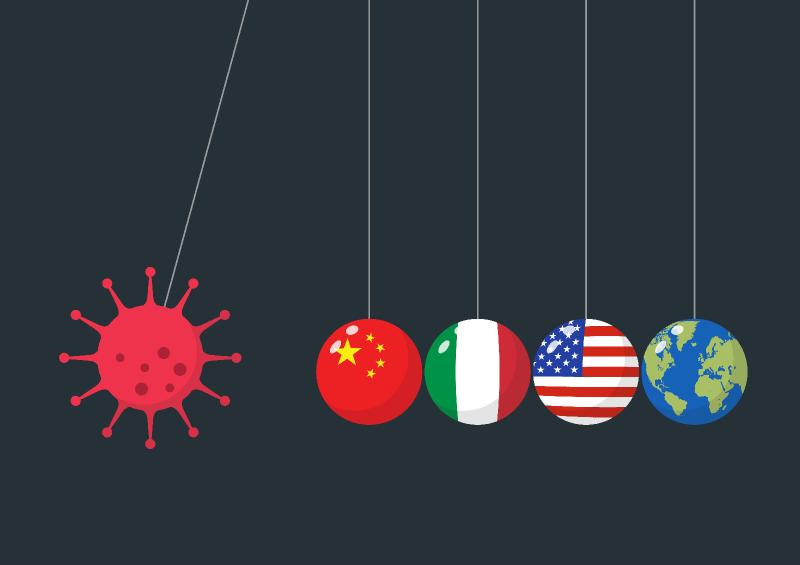The Right Begins A Reckoning With Globalization
By: Zach Carter (HuffPost)


HuffPo, being what it is, focuses attention on the right. But the left cannot simply sweep the appalling consequences of globalization under the rug any longer.
Ronald Reagan argued for a middle class of passive investors who used their own savings to offshore their own jobs. Bill Clinton used globalization as a quick way to reward passive investors through industrializing developing countries. But the result has been a perverted form of imperialism condemning people around the world to a future with little opportunity.
President Joe may be a free trader advocating NIMBY policies that appeal to middle class passive investors; however, Trump really has stripped away the sugar coating used to hide the inequalities, exploitation, threats, and consequences of globalization. Democrats blowing smoke about American consumers really can't justify exploitation of poor people around the world any longer. Removing Trump won't make that exploitation any more palatable.
The left will obviously weave a story of selective facts placing blame on the right. At this juncture the critical question isn't what the right has done in the past; the critical question is what the left will do to change the future. The establishment status quo simply won't do. Will the Democratic Party continue to be the party of slavery?

The staggering death toll of the coronavirus pandemic and the deep dysfunction it has exposed will forever alter domestic order in the U.S. But lost in the flood of daily domestic tragedies is a shift that may prove as consequential as the pandemic itself: the death of the international political order commonly known as "globalization."
Across the world, the pandemic has broken supply chains and strained old trade partnerships. The great economic alliance at the center of globalization ― the relationship between the United States ― the world's great consumer powerhouse ― and China ― the world's great manufacturing center ― is crumbling. It is far too early to foresee exactly how these two superpowers will reach new terms of coexistence, but whatever the ultimate result, the rest of the world is already preparing for a new order.
The political struggle to shape what comes next has already begun on Capitol Hill. A quiet battle currently being waged among Republicans reveals much of what is broken in the current international economic system, and helps illuminate what might replace it.
Last month, Sen. Josh Hawley (R-Mo.) introduced the Slave-Free Business Certification Act, a short bill that would require American corporations to investigate their supply chains for slave labor, publicly report their findings, detail any corrective measures being taken, and make the CEO of the company personally certify all of it. Nearly every item Americans purchase, after all, is the product of international inputs ― chemicals and raw materials from one part of the world, factories and works in another, and shipping routes that criss-cross oceans and borders before arriving on the shelves of American retailers.
Much of this complexity results from a simple quest for cheap labor. Lower wages for workers bring higher profits for shareholders. And while it would be unconscionable for American executives to use forced labor within American borders, most workers in their supply chains are not official employees of the companies whose brands are emblazoned on the things we buy. They're subcontractors, international joint ventures, subcontractors of international joint venture partners, and on and on. By forcing companies to examine the labor practices of their business partners, the bill would shine a light on the degree to which modern slavery is endemic to the modern global economy.
Hawley's legislation is what's known around Washington as a "message bill" ― one designed to get some press attention rather than actually become law. But it has clearly touched a nerve within conservative intellectual circles. Last week, economist Tyler Cowen attacked Hawley's bill as a misguided attempt to restrict trade that would hurt "low-wage, exploited labor just about everywhere" and could ultimately "increase slavery worldwide."
If forced to audit their supply chains, Cowen argues, companies that rely on cheap foreign labor will just stop working in low-wage countries altogether. Instead of getting seafood from Thailand, where human rights activists have long decried slavery on shrimp boats, they'll get it from some expensive place like Norway where they can be sure people are in fact paid. That means no more international investment for Thailand, according to Cowen, and higher prices for U.S. consumers.
This style of argumentation ― if you try to solve a problem, you'll only end up making it worse ― has been de rigueur among conservative economists for nearly a century. But Cowen has taken it to delirious new heights by applying to to slavery. It's one thing to argue that low-wage workers could lose their jobs if international investment dries up. But Hawley's bill is specifically addressed to slave labor. What do slaves stand to lose in this equation?
The United States has the largest consumer market on the planet. Cutting off access to American capital and consumption has been an effective tool in pushing for political reform in the past (see Apartheid South Africa).
Cowen's economic argument is ridiculous on its face, but his legal argument is no more impressive. While slavery is bad, Cowen says, determining how to uproot it is a delicate foreign policy decision that demands years of scrutiny. That foreign policy debate happened years ago. It is settled law. The United States imposed an outright ban on the importation of any product made with forced labor or child labor in 2016. Hawley's bill merely seeks to enforce that consensus.
Nevertheless, Cowen is breaking important new ground in the debate over the globalization project that began in the 1990s. Its early champions described the coming era of globalization as a win for citizens everywhere ― more trade would bring more jobs and more prosperity all over the world.
Once it became clear that much of the American middle class was losing out, however, globalization advocates changed their arguments. It was true that many of the gains from globalization came at the expense of U.S. workers, but the gains for the global poor more than made up for the loss of wealth stateside.
That newer story has been under pressure for years. Most of the wealth gains for the global poor have come in China, where they must be enjoyed in an authoritarian surveillance state that currently holds 1 million Uyghur in detention camps. A devastating new report from United Nations Special Rapporteur on Extreme Poverty and Human Rights Philip Alston reveals that extreme poverty is not being eradicated in poor countries, and that triumphalism on this point has been due largely to faulty metrics.
"The result is a Pyrrhic victory, an undue sense of immense satisfaction, and dangerous complacency. Using more realistic measures, the extent of global poverty is vastly higher and the trends extremely discouraging," Alston said. "Even before the pandemic, 3.4 billion people, nearly half the world, lived on less than $5.50 a day. That number has barely declined since 1990."
Shocking though it is to see an economist argue for corporate complacency on slavery, Cowen's attack on the Hawley bill is part of a conservative adjustment to reality. Instead of insisting that the world keeps getting better and that globalization is bringing progress and harmony, Cowen frankly acknowledges that after nearly three decades, slavery remains "by no means a rare phenomenon," citing well-publicized abuses in North Korea, Turkmenistan and Haiti.
And though it is not his intention to do so, Cowen indirectly illustrates the role of domestic inequality in global misery. Cowen is mathematically correct to note that "the losers" in a quest to eradicate international slavery "will be U.S. consumers, who will face higher prices and less choice." But higher prices only carry a sting for those on the lower rungs of the U.S. economic ladder. In a more equal America ― one in which middle class incomes had not been stagnant for three decades as gains for the super-rich exploded ― the prospect of modestly higher prices would be a very welcome price to pay for the eradication of slavery around the world.
Cowen's argument turns the old defense of globalization on its head. The global poor are not advancing at the expense of the American middle class ― the decimation of the American middle class makes it necessary for American trade policy to drive down living standards abroad. This is indeed the way the world works.
For Hawley, the trade bill is an extension of a years long effort to brand himself as a Big Thinker ready to move beyond the failures of neoliberalism. To date, it is an inconsistent brand. Hawley opposed a 2018 ballot initiative to raise the minimum wage in his home state (it passed easily without his support), and spent much of his time as Missouri Attorney General trying to take away health care from poor people. He relishes dishonest attacks on journalists and defends just about anything President Donald Trump does, including the president's 2017 tax bill that lavished benefits on the super-rich. He has earned every bit of skepticism he receives from progressives.
But there is a crop of young intellectuals trying to foster a new direction among Republicans. They include Oren Cass, executive director of American Compass, a new conservative think tank that eschews free-market fundamentalism, Hill.TV host Saagar Enjeti, and Marshall Kosloff of the Hudson Institute, another conservative think tank. Much of what this group is producing is very much in tune with what liberal scholars like Obama State Department alum Jennifer Harris and Nobel Laureate Joseph Stiglitz have been saying about globalization for years.
At the moment, neither of these intellectual factions appear to have much purchase within their respective parties. The fury with which Republicans have attacked unemployment benefits during the coronavirus crash suggests that whatever is happening in conservative op-ed pages, the old guard remains very much in control over policy making.
And while there are lawmakers on the Democratic side ― particularly Sens. Sherrod Brown (D-Ohio), Bernie Sanders (I-Vt.) and Elizabeth Warren (D-Mass.) ― who have put forward serious plans for a new kind of globalization, Joe Biden, whose legislative record on trade policy is in lockstep with that of Mitch McConnell, crushed all three in the 2020 presidential primary.
But the geopolitical order is changing, whether Republican and Democratic leaders want it to or not. The dysfunction the pandemic has exposed cannot be resolved without significant changes to the way goods are manufactured and distributed in the global economy and other countries are already examining alternatives. The question is whether American leaders will have the courage to help shape a new order, or continue clinging to the broken past.
Zach Carter is the author of "The Price of Peace: Money, Democracy, and the Life of John Maynard Keynes," now available from Random House wherever books are sold.



Will President Joe repeat the same trite argument that American consumers need to exploit people in developing countries? Will the Democratic Party continue being the party of slavery?
Democrats may assuage their guilt by pointing fingers at Republicans. And Republicans have earned condemnation for their role in global imperialism. But Democrats have also used global exploitation of poor people for their political benefit.
Maybe Trump really is correct. The United States needs to assume responsibility for itself rather than depend upon NIMBY global exploitation.
Isolationism is the alternative. Turning back time...
Will ignoring the consequences of globalization provide a path forward?
Trump is not advocating isolationism.